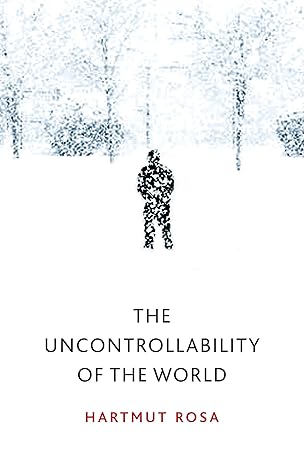More on this book
Community
Kindle Notes & Highlights
This is exactly what this book is about: modernity’s incessant desire to make the world engineerable, predictable, available, accessible, disposable (i.e. verfügbar) in all its aspects.
The driving cultural force of that form of life we call “modern” is the idea, the hope and desire, that we can make the world controllable. Yet it is only in encountering the uncontrollable that we really experience the world.
My hypothesis is this: because we, as late modern human beings, aim to make the world controllable at every level—individual, cultural, institutional, and structural—we invariably encounter the world as a “point of aggressions” or as a series of points of aggression, in other words as a series of objects that we have to know, attain, conquer, master, or exploit.
This attitude can even be found—not just latently, but manifestly—in situations where we don’t appear to be bent on “conquest” at all. Patrons of the famous German tourist bar Ballermann 6 on Mallorca “destroy” buckets of beer and sangria, while members of church choirs have to flawlessly “master Mendelssohn.”
this escalatory perspective has gradually turned from a promise into a threat. Growth, acceleration, and innovation no longer seem to assure us that life will always get better; they have come instead to be seen as an apocalyptic, claustrophobic menace.
This game of escalation is perpetuated not by a lust for more, but by the fear of having less and less. It is never enough not because we are insatiable, but because we are, always and everywhere, moving down the escalator. Whenever and wherever we stop to take a break, we lose ground against a highly dynamic environment, with which we are always in competition.
Because modern societies can stabilize themselves only dynamically, that is, through escalation, they are structurally and institutionally compelled to bring more and more of the world under control and within reach, technologically, economically, and politically:
We are structurally compelled (from without) and culturally driven (from within) to turn the world into a point of aggression. It appears to us as something to be known, exploited, attained, appropriated, mastered, and controlled.
When we resonate with the world, we are no longer the same afterwards. Experiencing resonance transforms us, and it is precisely this transformation that makes us feel alive.
Because resonance is inherently open-ended in terms of its results, it is fundamentally in tension both with the social logic of relentless escalation and optimization and with the corresponding attitude of constantly perceiving the world as a point of aggression.
This suggests that the motivation driving modern efforts to expand our reach is in fact nothing but our desire for resonance. Precisely because resonance itself is uncontrollable, the goal is to have “the world” at our disposal whenever the right moment arrives.
resonance always implies bilateral movement. It is not enough that I have access to and can take hold of the world. Resonance demands that I allow myself to be called, that I be affected, that something reach me from the outside.
A poem can resonate with me only as long as I have not yet fully grasped, understood, and processed it (dimension 3), only as long as it continues to occupy me and still seems to be hiding something from me.
My theory of “semicontrollability” may help to explain why home [Heimat] only becomes a resonant concept after we have already lost it.
Even if—and especially if—God is conceived of in generally negative theological terms, as fundamentally inaccessible or beyond control, the relationship between God and the human being is understood to be one of mutual relatedness and reachability.
Modernity’s relationship to illness is one of pure aggression—be gone with it!—and, when we are unable to beat it, we see ourselves as impotent failures.
One need not be an esoteric or cosmic kook to assert that we are nowhere close to being “finished” with what reality is—not conceptually, and certainly not in terms of our relationship with it.
We repeatedly discover new sides of ourselves, to which we then respond; and, as we get to know ourselves better and learn to understand our own reactions to things, we may deepen our skills and expertise, but we are never “finished” with ourselves.
Unlike relationships, objects can be thoroughly and reliably controlled. The logic of consumerism and commodity capitalism is thus based on responding to our unquenchable longing for resonance in the form of a promise of controllability, which channels the desires that guide our actions toward objects themselves. In effect, this corresponds to a process of fetishization.
If we no longer saw the world as a point of aggression, but as a point of resonance that we approach, not with an aim of appropriating, dominating, and controlling it but with an attitude of listening and responding, an attitude oriented toward self-efficacious adaptive transformation, toward mutually responsive reachability, modernity’s escalatory game would become meaningless and, more importantly, would be deprived of the psychological energy that drives it. A different world would become possible.
Our exasperation has its roots not in what is still denied to us, but in what we have lost because we now have it under our control.


